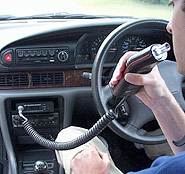
There’s developing technology exploring the possibility that a fingerprint-based ignition interlock device system may someday be installed in new vehicles in the hopes of stopping impaired drivers from operating their vehicles. In other words, sobriety tests in all new cars might prevent most drunk driving deaths.
Installing devices in new cars to prevent drunk drivers from starting the engine could prevent 85 percent of alcohol-related deaths on U.S. roads, saving tens of thousands of lives and billions of dollars from injury-related costs, according to a new analysis.
“Alcohol interlocks are used very effectively in all 50 states as a component of sentencing or as a condition for having a license reinstated after DUIs, but this only works for the drunk drivers caught by police and it doesn’t catch the people who choose to drive without a license to avoid having the interlock installed,” said lead author Dr. Patrick Carter, an emergency physician with the University of Michigan Health System in Ann Arbor.
Most drunk drivers make about 80 trips under the influence before they are stopped for a DUI, Carter said. “If we decided that every new car should have an alcohol ignition interlock that’s seamless to use for the driver and doesn’t take any time or effort, we suddenly have a way to significantly reduce fatalities and injuries that doesn’t rely solely on police.”
Carter and colleagues used U.S. records of traffic accidents and fatalities to determine how many involved drunk driving and then estimated how many of these incidents could be avoided in the future by fitting new cars with alcohol-interlock devices, which detect blood-alcohol levels and prevent drivers above a certain threshold from starting the car.
Then, they estimated the numbers of deaths and injuries that could be prevented in the first year that all new cars sold had screening systems, and assumed it would take 15 years for older models to be replaced with new vehicles.
Over the 15-year implementation period, interlocks may eliminate about $343 billion in costs from fatalities and injuries related to drunk driving, the researchers estimate. Assuming the device costs $400 per vehicle and is 100 percent accurate, the interlock would pay for itself after three years by way of avoided injury costs.
Getting DADSS into all vehicles can eliminate the element of chance involved in catching drunk drivers under our current system that relies on police, said Adrian Lund, president of the Insurance Institute for Highway Safety.
Unlike the alcohol ignition interlocks which require you to blow into a devise and are used for convicted drunk drivers, DADSS is a driver assist system that would be seamless, take less than half a second, and use infrared light to measure a driver’s blood alcohol content in the breath or through the fingertips, which is believed to be far more reliable.
My opinion? Although noble, these devices may cause legal problems and litigation than they’re worth. How accurate are the devices? Are they calibrated regularly? Do they store information which can be used against a defendant accused of DUI? Would the devices also test for the presence of drugs? If so, what if the driver has a prescription for the drugs? Only time will tell . . .
Please contact my office if you, a friend or family member are charged with a crime. Hiring an effective and competent defense attorney is the first and best step toward justice.






